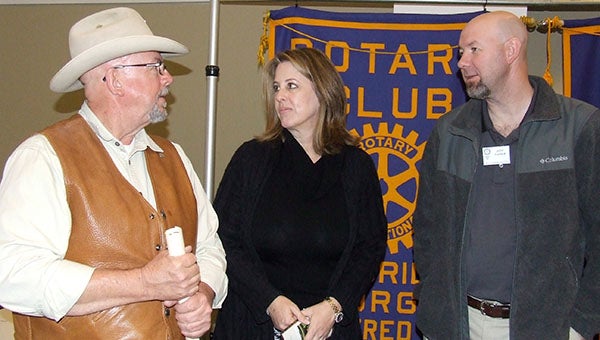Farmer talks improvements in industry across generations
Published 5:24 pm Tuesday, January 26, 2016

Will Harris talks with Rotarians, Kim Walden, who introduced him as the speaker, and Jeff Napier following the presentation. To learn more about the farm go to the website www.whiteoakpastures.com.
Will Harris, a fourth generation cattleman and owner of White Oak Pastures near Bluffton, came to Rotary Tuesday to talk about how his family farming procedures have changed over the last 150 years.
He said that 10 years ago the farm had three employees and sold a half million dollars worth of cattle.
Today White Oak Pastures employs 120 and deals with $28 million dollars in product.
This success has also had an enormous impact on the local economy, as the family business has bought up the old houses and renovated a small store in the town that had declined over the years as people left farming for the cities. So, how did this happen?
Harris said in 1946 when his daddy took over the family farm the goal was to centralize and industrialize agriculture with the goal of making food cheap, safe and abundant. He said, while it was very successful, it also generated a lot of unpleasant circumstances. For years they raised only cows and it was all about how many pounds they could yield and at what price.
He describes the current business as a very diverse operation focused on stewardship of the land and the animals. It also stresses team building among the employees, described as the actual life-blood of the organization, rather than straight economics.
They now pasture feed five species of animals, adding goats, sheep, hogs and rabbits to the cows. There are also five species of poultry. (Chickens, turkeys, ducks, geese and guineas) They raise only certified organic vegetables and all animals are pasture raised as well as hand butchered. They serve all the farm raised food in the old farm restaurant they have built on the property. You can dine in the Pavilion restaurant with a view of the farm and animals.
Cabins have been built for overnight lodging and tours of the farm are offered on Saturdays to visitors. Harris stressed that the visitors come more for educational purposes than recreational, although there is a pond to fish and horses to ride. There is a large population of 78 eagles, which he claims eat his chickens like popcorn.
Asked from the audience why he changed farming methods, he replied that although they were successful, he became increasingly disgusted with the excesses of the industry.
He now practices a system of rotating different species through the pastures. “Nature loves diversity,” he said and the animals all live in symbiosis with each other, as herds are rotated in a grazing system where the animals clean up after each other in nature’s way.
The farm has 2200 acres. Harris said land is precious and they are looking for more, as they believe they can process more land.
Harris mentioned that Andrew College in Cuthbert is beginning a new academic program offering a degree in Regenerative Agriculture. They plan to use White Oak Pastures as a resource for hands-on learning. He left the door open for a similar partnership with Bainbridge State College’s new Ag program.





